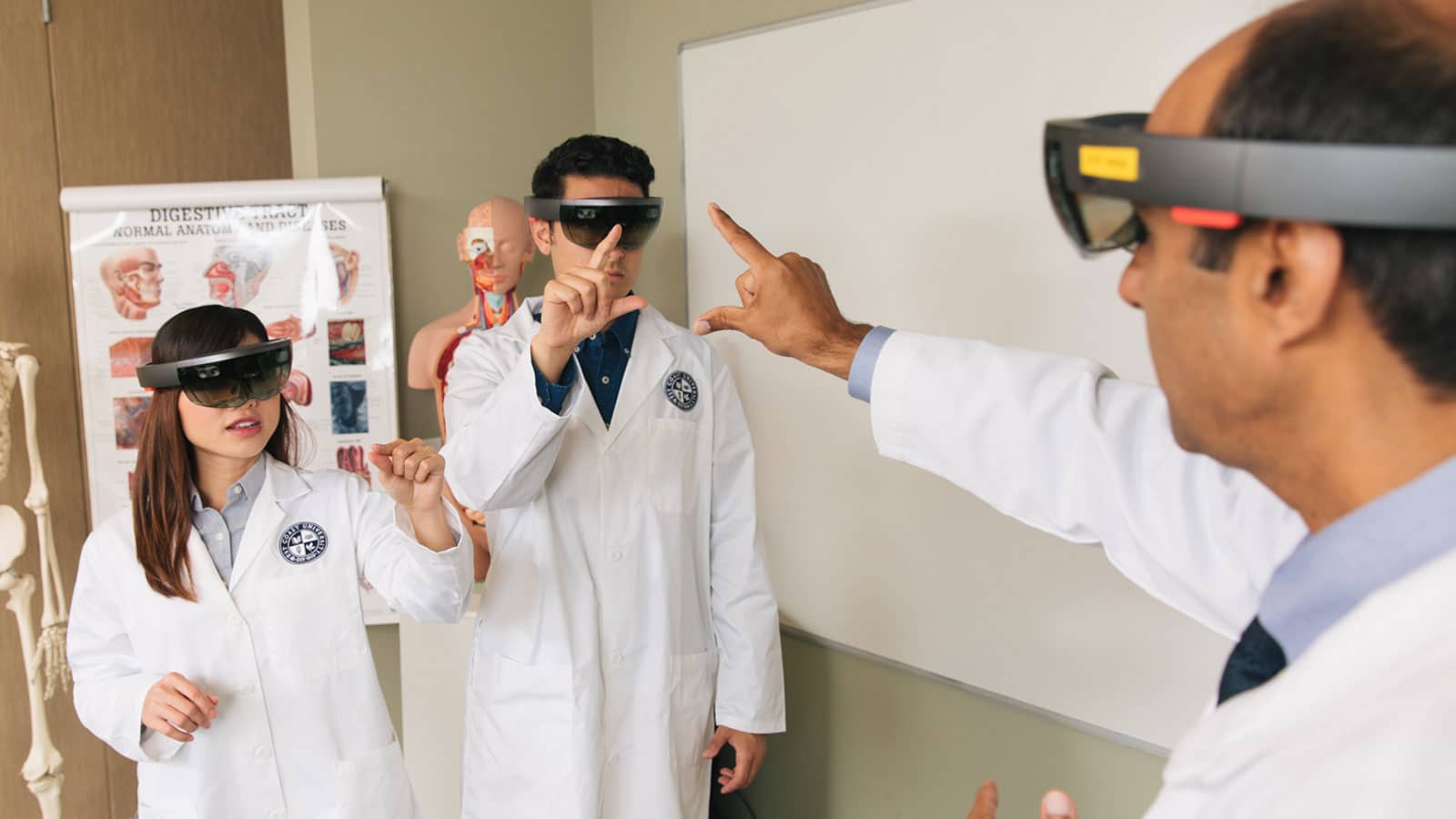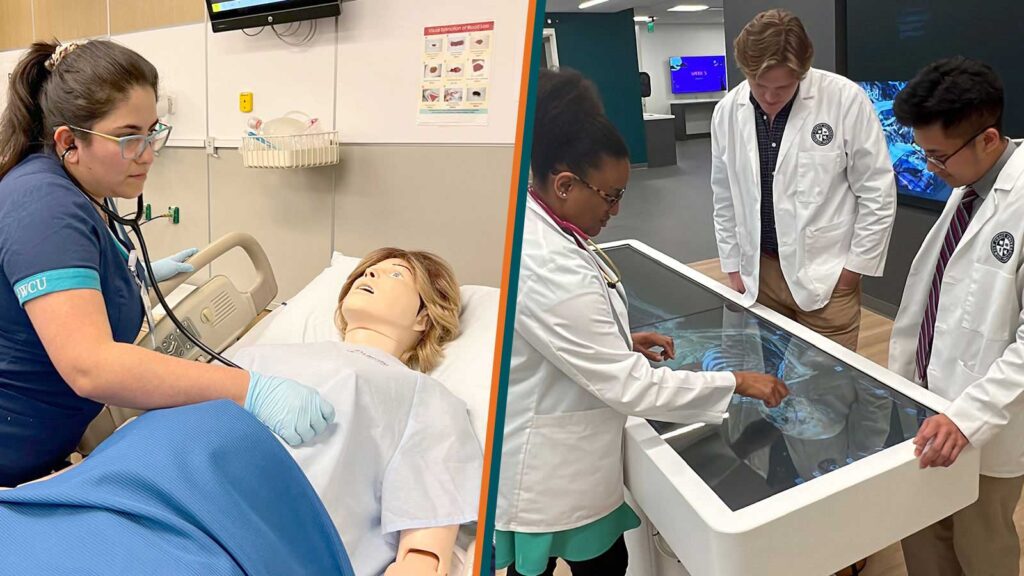West Coast University’s Innovation Lab puts modern technology and captivating media at students’ fingertips in order to give them more interactive and engaging learning experiences.
Learn about the lab’s education-through-innovation projects, starting with its professionally-filmed original shows.
On-Screen Stories That Keep Students Wanting to Learn More
One sunny Southern California day, an entire floor of the West Coast University campus building in Anaheim, California was transformed into a filming studio. Paid actors donned scrubs and lab coats as they scurried past each other in a makeshift office corridor, clipboards and medical supplies in hand.
Cameras rolled nearby, catching the conversation between a new nurse leader and his supervisor. A real life hospital chief nursing officer sat off-set watching the actors, jotting down notes, and giving feedback on how to make the scene more realistic.
No, this was not a filming session for Netflix’s next hit medical show…
It was a filming of WCU’s very own original series, Practice and Principle, which was created with the binge-worthy vibes you might get on a streamed show for personal entertainment.
WCU was filming its sixth professionally-filmed original series to be incorporated into the university’s course curriculum. This particular series focused on advanced practice nurses (such as nurse practitioners and nurse leaders) and the behind-the-scenes ethical and moral dilemmas they face on the job on a daily basis.
Master of Science in Nursing (MSN) students would watch the series later in the year as part of their coursework, following the main characters and their stories each week and getting a glimpse of what life is really like for an advanced-level nurse.
The other nursing-focused series that came before included:
● “Rounds,” an interactive drama about two early-career nurses who are navigating the challenges of working in a hospital ICU and emergency room (highlighting real-world applications of pathophysiology)
● “Anatomy of a Mystery,” following nursing student Natalia through her first clinicals where she has to use her anatomy and nursing knowledge to investigate a patient story that doesn’t quite add up
● “Hannah,” which tells the story of a wife and mother who takes a leap of faith and becomes an online nursing student to pursue her dream of making a difference, despite a slew of obstacles standing in her way
WCU also produced a reality series geared toward business administration students—in which 12 WCU alumni shared their stories of how they navigate work-life balance with their online degree program, and the resources that helped them succeed in their journey. This series was part of a project to reimagine the New Student Orientation experience for online students.
Watch these videos to learn more about WCU’s original shows:
“Hannah” Series Trailer
The Innovation Lab: Where Education Meets Art & Technology
WCU’s binge-worthy series are just one example of the numerous projects that the university’s Innovation Lab has spearheaded to help bring education to life for students.
The Innovation Lab at West Coast University has leveraged various forms of advanced technology – from hologram patient interviews and artificial intelligence (AI) patient simulations to Alexa-powered study guides and mobile games – in order to give its student opportunities to turn textbook material into more interactive and memorable learning experiences.
“As a university, we’ve always been innovative, we’ve always been ahead of the curve,” said Marwan Alamat, WCU’s Vice President of Online Operations who was charged with launching the Innovation Lab. “We’ve dedicated a department that focuses on the future of education to bring arts, to bring technology to better the student experience and better the student outcome.
At the lab, we’re always looking for opportunities to make learning mobile, accessible, and immersive.”
What We Do video?
Learn more about the Innovation Lab’s projects.
Innovative Learning Tools Designed to Prepare Students for the Future
The Innovation Lab’s goal is to use innovative and technologically advanced tools to help WCU students learn more effectively while preparing them for the demands of a fast-changing workplace. Here is a quick overview of some of the projects the lab has launched in recent years:
AI-Driven Patient Simulator
Using PSC Spark’s artificial intelligence-driven hologram technology, students can interact with a simulated patient that acts like a real person. The virtual patient is programmed to understand more than 30,000 questions, making it easy for students to practice their patient interview and assessment skills.
Alexa-Powered Study Guides
Students at WCU can use Microsoft HoloLens headsets to visualize organs and body parts and gain a better understanding of how they work individually and together. Virtual reality is a powerful form of simulation training for healthcare professionals!
Mobile Medical Terminology Game
WCU’s Mediabytes, which was created in-house, is a game that students can play right on their smartphones to learn the medical terminology they will encounter in class. The mobile game helps them earn the language of medical terminology—not by memorizing, but by understanding the Latin or Greek root of the words, suffixes, prefixes, and correct pronunciation. Students play the game on the go as an assignment and earn points by submitting their progress.
Virtual Dissection Tables
WCU’s Anatomage table is a 3D anatomy visualization and virtual dissection tool that allows students to view and interact with images of real cadaveric tissue. This tool reinforces students’ knowledge of anatomy and physiology, and it gives them a visualization of what signs of disease look like in the human body.
Virtual Pharmacy
One of WCU’s very own faculty members partnered with the Innovation Lab to create a simulation that allows students to practice filling drug prescriptions by recognizing generic drug names and navigating the layout of a traditional community pharmacy prior to their rotations.
On-Campus Professional Studio
Through the WCU Innovation Studio, professors have access to professional filming
equipment and editing tools right on campus so they can create their own high-quality videos to aid students in learning. Check out examples of past productions on YouTube.
How Innovation Lab Projects Are Born
According to Marwan, the Innovation Lab does not work in a vacuum – rather it sources its ideas straight from the educational community.
The lab uses a special platform to collect ideas for innovative learning and obtain feedback directly from WCU’s faculty, associates, and students. This collaboration helps the university’s leadership assess which projects have the highest need and which will likely get the best traction in terms of student adoption and learning outcomes.
Once a project is identified as a potential success, the Innovation Lab launches a pilot program that is tested by staff and students on a smaller scale. If the project produces strong favorable results, it then has to be approved by the university’s leadership so it can be rolled out at a larger scale.
“One of the most important parts of the educational innovation process is to bring faculty, associates, and students along with us on the journey,” Marwan said. “Our goal is to innovate with [faculty and students], not to them. By approaching innovation as a collaborative process, we help to ensure that we maintain a student-centric focus in our work.”
The university’s Innovation Lab team is continually exploring ideas for new projects and effective expansion of existing projects. Read more about the Innovation Lab at WCU and its enhanced learning experiences
WCU provides career guidance and assistance but cannot guarantee employment. The views and opinions expressed are those of the individuals and do not necessarily reflect the beliefs or position of the school or of any instructor or student.

